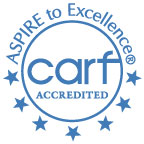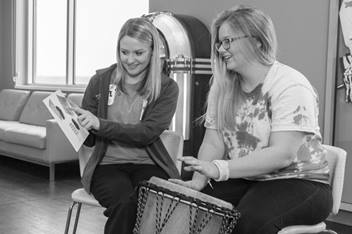Why Choose Our Rehabilitation Program
There are many reasons why we’re a leading pediatric Inpatient Rehabilitation Program.
-
For the past five years, the Inpatient Rehabilitation Program has received high satisfaction rates from our customers, including patients, families, payer sources and referring physicians.
-

We are accredited by The Joint Commission (TJC) and the Commission on Accreditation of Rehabilitation Facilities (CARF) for our comprehensive Inpatient Pediatric Specialty Program.
-
We are a pediatric family-centered inpatient rehabilitation program. The child/adolescent and family are the core of our Rehabilitation Team. Parents are considered an extension of their child, not a visitor.
-
Our most important goal is to successfully return patients to home, school and the community. Our successful school reintegration program involves the family and school as key players.

-
We are also a member of the International Pediatric Rehabilitation Collaboration (IPRC).
-
We are located within a 527-bed pediatric Level I Trauma Hospital, with direct and immediate medical services available:
-
Onsite services available - Medical services 24/7 in-house coverage
- Diagnostic services (Radiology, Ultrasound, etc.) - results available within 4 hours, unless ordered STAT and then reported immediately
-
Laboratory services - results available within 4 hours, unless ordered STAT and then reported immediately
-
Pharmacy services - 24/7 availability
-
We feel that adolescents are not little adults but are individuals that are still developing and maturing, who need a family-centered approach to rehabilitation.
-
All of our patient rooms are private with an attached bathroom and tub/shower.
-
Parents are welcome to spend the night in their child’s room. We also have a Ronald McDonald House located on our campus.
Family-Centered Care
At Nationwide Children’s Hospital, we focus on family-centered care. That means we care about the family’s needs as well as the child’s. We recognized the entire family as the constant in the patient’s life. It also means that you, the family, play an essential role in your child’s care.
We recognize that each child we treat is a member of a unique family with varied values, needs, environments, cultures, resources and strengths. We are committed to ensuring our facilities and staff support family-centered concepts that promote efficiency, flexibility and quality care while honoring the family’s need for confidentiality and privacy.
At Nationwide Children’s, you’ll find staff who are completely committed to improving the lives of children everywhere. The Inpatient Rehabilitation Program has adopted these critical components.
We will:
- Work with the family in planning and providing care
- Share all information about the patient’s care and progress in a supportive way
- Practice policies that support the emotional and financial needs of the family
- Recognize every family has strengths and respect the family’s ways of coping with the patient’s care, hospitalization and rehabilitation
- Consider the developmental needs of each patient and family in planning and providing care
- Assist the family in meeting with other parents for encouragement and support
- Ensure our program will be flexible, accessible and responsive to the patient’s and family’s needs
Meet Beck, Our Medical Dog
Beck joined the Inpatient Rehabilitation Team in May 2016. He joins Hud II as part of our Animal-Assisted Therapy (ATT) Program.
Our medical dogs are exceptionally trained from Canine Companions for Independence, a national organization that trains service dogs. Each is cared for by an Nationwide Children’s employee who has received training as a facility dog handler and incorporates the dog into their job-specific responsibilities.
Since the program was initiated, these specially trained dogs, under the guidance of professional clinicians, have helped countless children and adolescents gain more independence and confidence. They make very challenging activities fun and provide unconditional acceptance and love to our patients and their families. Different from visiting “therapy dogs,” Hud and Beck may work alongside the following providers:
-
Trained therapists to target specific goals, while also providing comfort and companionship
-
Speech pathologists to work on talking or remembering commands after a brain injury.
-
Occupational therapists to encourage a patient who has had a stroke to use a weak hand to pet the dog or hold the leash
-
Physical therapists to help with walking longer distances
-
Recreation therapist to help reduce anxiety and improve empowerment in a child who is struggling with mental health challenges
The program began in 2006 with Ansley, a black lab-golden retriever cross, who joined the team after extensive training as a service dog with Canine Companions for Independence. Hud II was added in 2014 to focus on inpatients on the behavioral health unit. Ansley retired after eight years of service.

